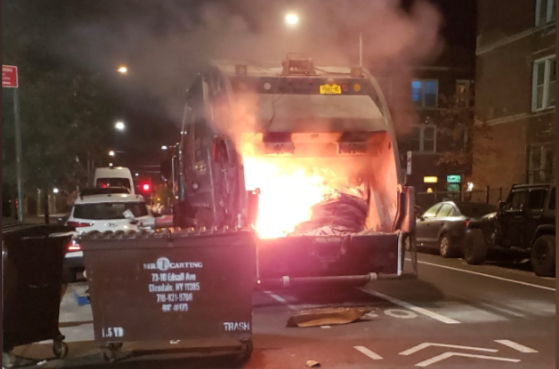Lithium-ion batteries are exploding in NYC's garbage trucks. Only you can stop them.
Aug. 24, 2024, 12:01 p.m.
Don’t put your e-bike batteries — or any lithium-ion batteries — in the trash.

Lithium-ion batteries are increasingly exploding inside garbage trucks, endangering New York City's sanitation workers.
The long, rectangular batteries used in e-bikes have become a fiery threat to New York City homes, and have led to as many as 626 blazes and 26 deaths since 2022, according to the FDNY. These batteries are found in everything from power tools to vapes to laptops, and are now so ubiquitous that sanitation workers say they’re also finding their way into trash streams.
The number of sanitation department collection truck fires that were either caused or likely caused by discarded lithium-ion batteries increased from just 1 in 2017 to 28 in 2023, according to the agency. And so far this year, there have already been 23 such fires through the beginning of August, though no injuries have been reported.
“People still somehow hide them in black bags and throw them into the trash,” said Ari Kesler, chief operating officer of My Battery Recyclers, a hazardous waste transporter that focuses on e-waste.
“It’s out of sight, out of mind. Another person’s problem. So a garbage guy at 2 in the morning sees a bunch of bags on the corner, how does he know a battery is in it?”
When the compactor comes down on the batteries in the truck, or when the batteries get mixed with liquid, they become damaged mechanically, Kesler said, triggering explosions. And once workers on the truck smell or see smoke, they have no choice but to immediately dump their load of trash. “Basically they dump all the garbage that they just picked up in the middle of the street,” Kesler said.
- heading
- What should I do with my e-bike batteries and other lithium-ion batteries?
- image
- image
- None
- caption
- body
- Do not put batteries in the trash, recycling or buildings’ e-waste pick-up bins.
- Stores that sell rechargeable batteries like lithium-ion batteries for e-bikes are required to accept them back for recycling. If a store won’t take your rechargeable batteries, contact the New York State Department of Environmental Conservation, or call 1-800-847-7332.
- Drop off batteries at the city’s designated sites, which are open every Saturday and on the last Friday of every month from 10 a.m. to 5 p.m. There is a location in each borough. The city also hosts special disposal events, including three in September.
- Check out Call2Recycle, a nonprofit that offers options for safely shipping batteries for recycling.
- To get more information on safe battery disposal, call 311 or go to nyc.gov/batteries.
Firefighters then put out the fire and pack the burning battery's remnants in a specialized drum, because lithium-ion battery fires are notoriously difficult to extinguish. Kesler’s company later takes the burned batteries and recycles them by extracting and reselling raw materials like cobalt.
Adam Mitchell, vice president of sales and marketing at the waste management company Boro-Wide, said his workers have experienced about a half-dozen such fires in the last couple of years.
Last year in Bushwick, a battery — possibly used in a light fixture or in a speaker system — was picked up by one of Boro-Wide’s crews after being discarded by someone at a multi-tenant studio space. A fire ignited after lumber was loaded into the truck at the next pickup location, Mitchell said.
“The intensity of the heat is like nothing else you’ve seen before,” he said. “And it’s like it’s a volcano … It’s not a slow-burning type fire, it’s an instant inferno.”
Fires also occur at waste facilities. A lithium-ion battery is believed to have caused a fire aboard a sanitation department barge in December 2021.
And fires caused by the batteries regularly occur at Balcones Recycling in Sunset Park, where the city’s residential metal, glass and plastics are taken, according to a sanitation spokesperson.
Each borough has just one drop-off site, but City Councilmember Sandy Nurse said more such sites are needed to address the issue. She sponsored a resolution in support of a state bill that would require battery manufacturers to reimburse governments for disposal costs.
“It shouldn’t be on the taxpayers, it shouldn't be on the consumers to pay for the end life of these products that are produced to break down pretty quickly,” Nurse said. “We really need the companies to pitch in, especially since people are losing their lives.”
New Yorkers are throwing away less trash, but more lithium-ion batteries and vapes, study says